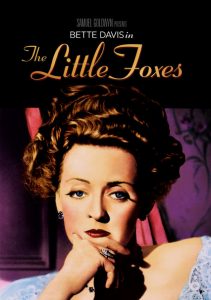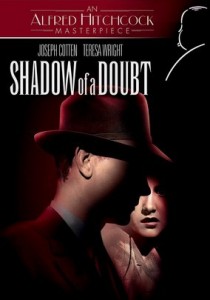The Little Foxes-1941
Director William Wyler
Starring Bette Davis, Herbert Marshall, Teresa Wright
Scott’s Review #866

Reviewed February 14, 2019
Grade: A-
Any film starring the ravishing and dynamic Bette Davis is worth watching. Still, The Little Foxes (1941) was released during the Hollywood legend’s heyday, and the actress elicits an intense character portrayal.
The film is a complex story of Southern scheming and contains enough intrigue to keep the viewer compelled after a slow start.
Filmed in black and white and due to its age, the film quality is not the best, the story nonetheless builds in suspense, especially during the final thirty minutes. This culminates in a frantic conclusion, with Davis deservedly taking center stage.
Southern matriarch Regina Hubbard Giddens (Davis) is sophisticated and angry. The female member of an affluent family is in a time when men rule the roost and her brothers control the family money, leaving her with little power.
Living nearby, Benjamin (Charles Dingle) and Oscar (Carl Benton Reid) flaunt their wealth while Regina struggles for every crumb she can get. After the family embarks on a deal to profit from a cotton mill merger, Regina schemes to score riches by any means necessary.
The southern setting with luxurious estates and more than its share of cultural and cuisine flavors serves The Little Foxes well with a palpable atmospheric style. With an antebellum, white dress, grits, and brandy featured, the goodness and girth of a proper way of living are featured.
Prominent black characters exist, primarily serving as the household help or various service roles to white folks, for 1941 this was considered progressive for studios to feature minorities so heavily and must be praised for the inclusiveness.
Throughout the run of the film, I felt a push/pull whether I sympathized with Regina or despised the character.
Comparisons to Gone With the Wind (1939) entered my mind, many having to do with Regina herself. Flirtatious when she wants to be coquettish to fit her needs, she is a cross between Scarlett and Melanie.
I even began to champion the character at one point and the plight of a female in the early 1900s who could not be taken seriously as a businesswoman.
The Little Foxes is brazen in that it champions a strong and determined female character. Regina will not merely stand behind any man but chooses to stand on her own two feet.
Cinema in the 1940s was known for portraying female characters as independent and self-sufficient, and this film is a prime example of this movement.
In the film’s final act, there can be no denying the true colors of Regina, and any sympathy or comparisons to the characters are ultimately dismissed diabolically. The character is faced with the choice to either do the right thing and save a life or cross the line and let a beloved character die.
The scene is pivotal and emotional when she chooses the latter. She has made an important decision that she can never reverse.
Director William Wyler shoots the astounding Davis in myriad ways central to the character’s motivations. Appearing determined and driven in some scenes and downright devious in others, Davis excels at doing so much with her enormous and expressionistic eyes.
The Little Foxes portrays her as a complex and unrelenting character tailor-made for Davis’s talents.
To say that Regina gets away with murder is an unfair statement. Wyler makes it clear that despite benefiting financially, the character is forever shrouded in suspicion by her brother and her daughter (Teresa Wright), who decidedly embarks on a new life in Chicago, never to see her mother again.
This leaves Regina fearful and lonely in her grand house.
The Little Foxes (1941) succeeds as a showcase for the emerging talents of stalwart Bette Davis, and it is a good, solid drama. Schemes, conspiracy, and backstabbing are prevalent themes, but the film also contains a melancholy subtext of loneliness and fear.
Appropriately, Ms. Davis is awarded the final shot, a close-up that reveals the star power she had begun to muster as her career was in full swing.
Oscar Nominations: Outstanding Motion Picture, Best Director-William Wyler, Best Actress-Bette Davis, Best Supporting Actress-Patricia Collinge, Teresa Wright, Best Screenplay, Best Scoring of a Dramatic Picture, Best Art Direction-Interior Decoration, Black-and-White, Best Film Editing

